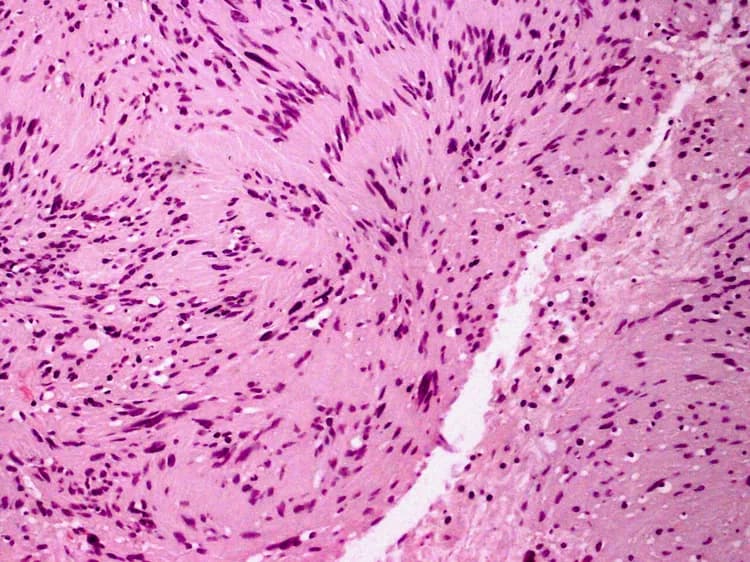What are the other Names for this Condition? (Also known as/Synonyms)
- PEN (Palisaded Encapsulated Neuroma)
- Solitary Circumscribed Neuroma
What is Palisaded Encapsulated Neuroma? (Definition/Background Information)
- Palisaded Encapsulated Neuroma (PEN) is a painless benign tumor of the nerve fibers
- Unlike a traumatic neuroma, which is a tumor that occurs at a site of injury or trauma; this tumor arises with no history of prior injury or trauma
- PEN is not a common tumor and is commonly mistaken for a tumor called schwannoma
Who gets Palisaded Encapsulated Neuroma? (Age and Sex Distribution)
- A Palisaded Encapsulated Neuroma occurs in the fifth to seven decades of adult life
- Both males and females are affected with equal frequency
What are the Risk Factors for Palisaded Encapsulated Neuroma? (Predisposing Factors)
The risk factors for Palisaded Encapsulated Neuroma include:
- A positive family history of the tumor occurrence
- Presence of certain syndromes such as multiple mucosal neuroma syndrome and multiple endocrine neoplasia syndrome (MEN 2B)
It is important to note that having a risk factor does not mean that one will get the condition. A risk factor increases ones chances of getting a condition compared to an individual without the risk factors. Some risk factors are more important than others.
Also, not having a risk factor does not mean that an individual will not get the condition. It is always important to discuss the effect of risk factors with your healthcare provider.
What are the Causes of Palisaded Encapsulated Neuroma? (Etiology)
The cause of formation of Palisaded Encapsulated Neuroma (PEN) is unknown. In some individuals, genetic factors may play a role. The tumor may occur either due to inherited factors, or due to spontaneous development.
- The inherited type is due to the presence of genetic mutations at birth, which increases ones chances of getting this tumor
- Genetic mutations of RET proto-oncogene involving both somatic cell lines and germinal cell lines have been detected in both inherited tumors and acquired tumors. Proto-oncogenes are normal genes that may potentially turn into cancer-causing genes
- Somatic mutations are genetic mutations occurring in non-germ cells (non-germ cells are all cells other than the egg or sperm cells). Since somatic mutations do not affect germs cells, such genetic alterations are not inherited, or passed on to next generation
- Germinal mutations are genetic mutations occurring in germ cells (the egg or sperm cells). Since germinal mutations affect germs cells, such genetic alterations are inherited, or passed on to next generation
- Not all PENs have the mutation for RET proto-oncogene. In other words, one does not require a RET proto oncogene mutation, in order to be affected by PEN
What are the Signs and Symptoms of Palisaded Encapsulated Neuroma?
The signs and symptoms of Palisaded Encapsulated Neuroma may include:
- The majority of Palisaded Encapsulated Neuromas occur on the face (in over 90% of the cases). The remaining 10% of them can occur anywhere on the body
- A PEN occurs as a single, raised, dome-shaped nodule on the skin. The mass is not painful to touch
- The dome-shaped nodule is usually skin-colored, or occasionally pink
How is Palisaded Encapsulated Neuroma Diagnosed?
The diagnosis of Palisaded Encapsulated Neuroma (PEN) is as follows:
- A thorough physical examination with evaluation of medical history
- The diagnosis of PEN is made through a skin biopsy:
Pathological examination of the biopsy shows characteristic histological findings, when examined under a microscope. The pathologist may use special techniques, such as immunohistochemistry stains, to help arrive at the diagnosis.
- It is important to note that these tumors are associated with multiple endocrine neoplasia syndrome (MEN 2B). Hence, tumors associated with MEN 2B should be clinically considered
Many clinical conditions may have similar signs and symptoms. Your healthcare provider may perform additional tests to rule out other clinical conditions to arrive at a definitive diagnosis.
What are the possible Complications of Palisaded Encapsulated Neuroma?
Most of the tumors do not cause any significant complications. However, some of the complications associated with Palisaded Encapsulated Neuroma could include:
- Cosmetic issues since a majority of the tumors occur on the face
- Removal of the tumors using surgery may result in a scar; this may yet again cause cosmetic issues in some patients
How is Palisaded Encapsulated Neuroma Treated?
Palisaded Encapsulated Neuroma is a benign tumor, and a complete surgical excision of the tumor is curative. The tumor does not recur when it is completely removed.
How can Palisaded Encapsulated Neuroma be Prevented?
Currently, there are no methods available to prevent Palisaded Encapsulated Neuroma formation.
What is the Prognosis of Palisaded Encapsulated Neuroma? (Outcomes/Resolutions)
- Palisaded Encapsulated Neuroma is a benign tumor; the prognosis is excellent after complete removal of the tumor
- If the tumor occurs as part of a syndrome, then prognosis can vary depending on the conditions of the associated syndrome
Additional and Relevant Useful Information for Palisaded Encapsulated Neuroma:
- A pathologist will find that Palisaded Encapsulated Neuroma is positive for immunostains, such as S100 protein and collagen type IV. Neuron-specific Enolase immunostains is also positive
- It has been found that in addition to the above-mentioned immunostains, the PEN tumor is occasionally positive for CD57 (Leu-7) and myelin basic proteins.
There are two rare variants of Palisaded Encapsulated Neuroma:
- Plexiforme and multinodular type
- Spontaneous non-encapsulated neuroma type, which is often present as part of multiple mucosal neuroma syndrome and as a part of multiple endocrine neoplasia syndrome (MEN 2B)
Related Articles
Test Your Knowledge
Asked by users
Related Centers
Related Specialties
Related Physicians
Related Procedures
Related Resources
Join DoveHubs
and connect with fellow professionals



0 Comments
Please log in to post a comment.